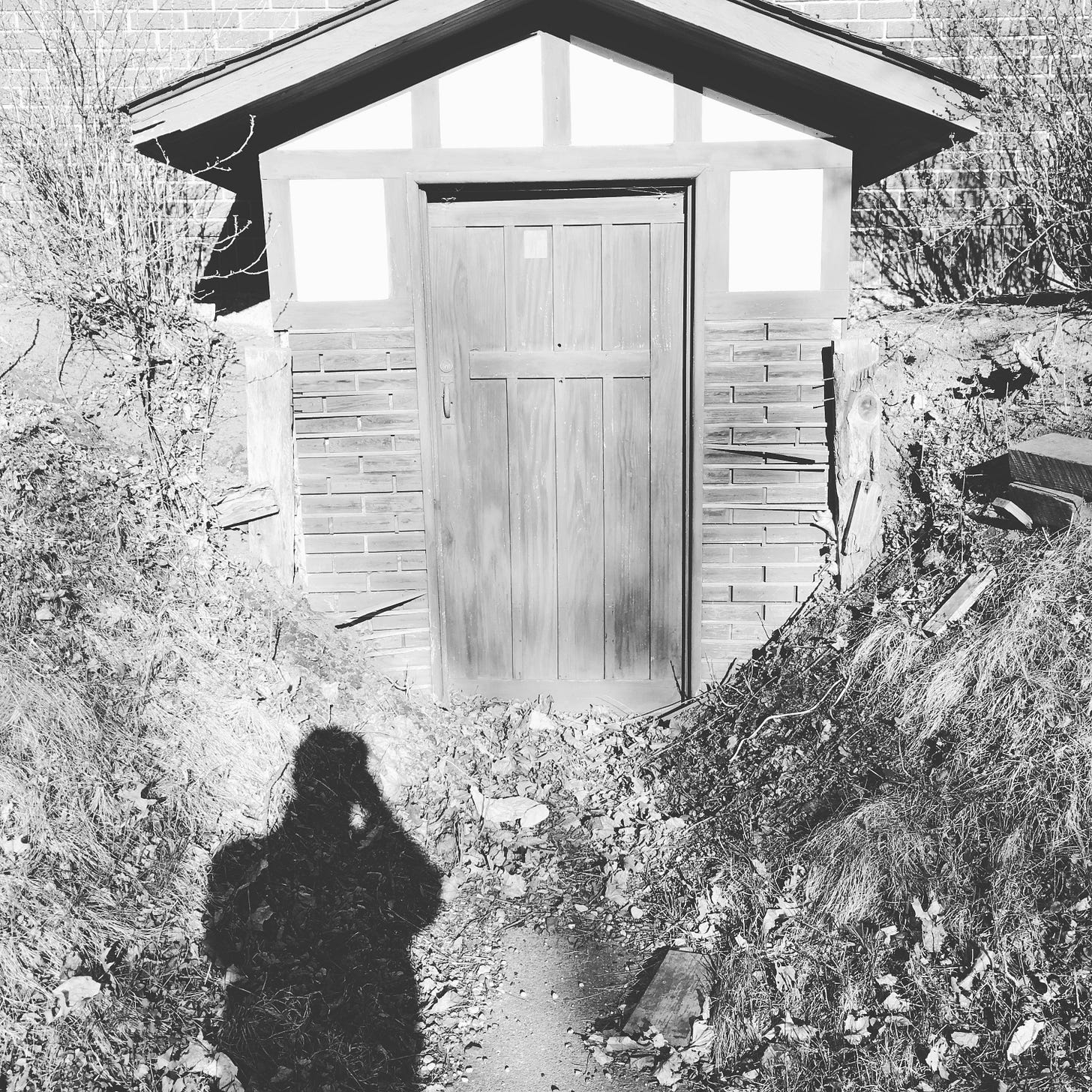Me and My Shadow
Nightwalking in broad daylight
“Mystic shadow, bending near me,
Who art thou?
Whence come ye?
And—tell me—is it fair
Or is the truth bitter as eaten fire?
Tell me!
Fear not that I should quaver,
For I dare—I dare.
Then, tell me!”
—Stephen Crane, The Black Riders
I really haven’t been able to get it out of my head.
And I’ve thought more about it since Russia invaded Ukraine.
It was many weeks ago and it was so disturbing that I’d intended to write it down, but didn’t. It was a weekday, late afternoon, and I was heading westward to home, probably after finishing my workday and even after having an early supper out. Since I no longer own a car, it was on the city bus, which that afternoon was raucous with lively chatter—completely different from the usual mid-pandemic, heads-down stony silence.
The sun hadn’t yet set, so there was plenty of light. I’m not sure when the young guy got on the bus, but he had on headphones and seemed a tad edgy. I didn’t think much of it at the time because, hey, who isn’t edgy these days? He sat at the front of the bus, had a scraggily beard, and kept eyeing two young Black men who were chatting and laughing farther back on the bus.
I was sitting between all this, so I had a good view. The young men were oblivious, laughing and joking as they were—but I noticed it. Scraggily white guy (SWG) seemed agitated—slightly murmuring to himself and glaring angrily at the Black guys.
Uh-oh, I thought.
Will I have to intervene if he does something more overt? I was feeling nervous, but quickly noodled a strategy in case things went south fast. I was also hoping SWG would just quietly get off the bus before anything ugly happened.
I kept my eyes fixed on SWG. It was somewhat fascinating, to see an emotion churning in someone you didn’t know, and to recognize the emotion as something, well—worrisome. I was feeling a lot of things: concern about anything happening to my fellow bus passengers, so intervention would have to involve the bus driver as the primary authority figure. I also felt pity for the our young SWG.
It was clear what I was witnessing: Hate. Repulsion. Prejudice.
And there I was, feeling pity and apprehension.
Fortunately, SWG got off the bus and no one (except me) was wiser. But it got me thinking: What would I have done if SWG had made a scene and things had gotten violent?
What should any of us do?
And more particularly, how can we all become better stewards of our own dark sides, our own worst natures, our shadows?
I’ve been thinking about the bus incident because there is a lot of hatred, anger, and prejudice coursing through the world just now. It’s all over the news, and has been for many, many years. Until the last two, it’s been hiding in the shadows. Now it’s out in the open. Like, if you’re Vladimir Putin, your formerly closeted role-playing scenario has now just morphed into The Game That’s Played For Keeps (aka Global Thermonuclear War). In front of the whole world.
And what’s really scary, whether on the world stage or a local bus—it affects everyone.
So rather than preachify or bloviate about what other people should or should not do, I considered my own shadow, particularly when it’s not under the cover of darkness or forgetfulness, or dismissed as inattention or that I’m “just having a bad day.”
And taking from my earlier analysis that what I term “Nightwalking” exists on a scale from either a sour mood, indigestion, or a flash of petulance, all the way down to rancor, ill will, and bitter enmity and completely indulging myself in those darker emotions, the upshot is I certainly know what my bad flavors are, after years of living through their worst expressions.

I’m not sure how instructive it would be to bust out a complete litany of my Nightwalking shadows, but it would be helpful to voice ones I’m currently dealing with.
And here’s where you (and anyone else out there) can maybe help us out.
One of things I’ve devoted to this Substack site is how to get the best bang for your buck out of the language we all use to describe our emotions. That’s why I so enjoyed reading Brené Brown’s Atlas of the Heart, and rolled out this site’s “Shades of Meaning” feature, and continue to toss around weird terms such as Daytalking, Nightwalking, and Stargazing, as if they meant as much to other people as they do to me.
So, here are just two “Nightwalking in broad daylight” emotions I’m dealing with now, as best I can describe them:
Micro-sadness moments.
This crap hits in the middle of the night, early morning (that’s its favorite time of day) and odd moments during the day. It’s more emotion than thought, but if I had to tease out some language it usually goes: “You’ve run out of rope. Your life is over.” “It’s hopeless. Just give up now.” “No one likes you. They never have.” “You’re alone for a reason: No one can stand being with you.”
Crazy, huh? And pretty harsh!
I call them “micro-sadness moments” because they flit in and fly out, almost as if they had a perfunctory duty, did it, and then went off to torture some other poor soul. I’ve been better about catching them as they occur and oh how I hate them. They seem to appreciate my hatred, smile slyly and say, “Oooh, you’re one of us! See you tomorrow!” Followed by a wink and a door slam.
Which is hugely maddening, as you might imagine.
I’ve probably had these micro-sadness moments all my life. It’s only since I began digging more deeply into Daytalking, Nightwalking, and Stargazing that I’ve been able to single them out and winnow them down to this term. But what to do about them? Well, maybe “the price of freedom is eternal vigilance” plants a flag, and we all wish for a pill to make it go away but, sigh, it won’t.
Which ironically might be another micro-sadness moment in the making.
Sigh.
Festering impatience.
This has been a personality bug for a long time, and guess what Sherlock? It runs in the family. My father had it, my brother has it, I have it. So, it’s a learned behavior.
It’s not only impatience, it’s also a judgmental attitude. And it’s infuriating. Just this past week I caught myself doing it time and time again. It most often involves other people, doing something that seems vastly more time-wasting to me than it does to them. Or so it seems. I could be right, but I end up feeling put-upon and fidgety. I start mumbling to myself (my term du jour is “tedious,” as in “you’re being tedious”) so I’ve had to stop myself and go: “Hey. Others can feel your negative energy in an instant. Knock it off, wise guy.” So, Big Time Self-Regulation. Yay me for catching it. But I’m still feeling judgmental the next time I run into something I declare—
TEDIOUS! (Maybe you’ve had a similar thought about these Substack missives.)
So, at the end of the day, where do we go with all this?

Ironically, it’s by doing what I’ve been trying to do here: telling the story of the SWG on the bus, and then revealing some of my own swerves into the Shadowlands of Nightwalking.
We’ve all been there, but maybe we didn’t have the words for it. As I’ve said, Nightwalking is the tongue-tied, idiot stepchild of my personality triad. I’m willing to bet it had the upper hand when I was younger, but I’ve got its number now that I’m older. And writing about it here.
You’d think that’d give me a pass, but…uh, no. I don’t. Nor should you.
Here, I think, is the way out.
Rather than stew and ruminate and hyperventilate about the stories you keep telling yourself (or me about my micro-sadness moments and festering impatience), perhaps we should adopt a strategy for dealing with it. Especially if you know you experience it time after time. As Daniel Pink says about his current book The Power of Regret (next up on my reading list), the problem of not addressing negative emotions is leading to more teenage suicide, clinical depression, and socially broad mental health challenges. “It’s not because we’re broken people,” Pink says. “It’s because we’ve been fed a bill of goods about endless positivity, not giving people the basic building blocks for how you deal with negative emotions and how they can actually clarify and improve your life.”
For example, in my case, hit with a “micro-sadness moment,” I immediately belt out: “That’s not true!”—literally trying to shout down the offending emotion. At least, that’s what I’ve been doing. While strange for onlookers to behold, if it works, it works. For “festering impatience,” I’ve been taking a deep breath and reminding myself I’m not the goddamn center of the universe. I’ve even tried smiling and saying something kind, even if it felt unreal to do that at the time. That, too, seems to work.
Hey, we all want to live in a better world.
But we can only have that world if we first do the work in our own backyards.
What do you think?



